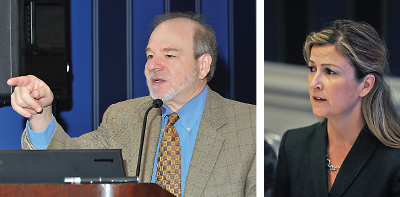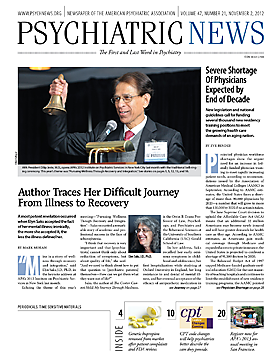Poor reimbursement and administrative burdens are among the significant barriers to the provision of psychotherapy by psychiatrists, according to a study conducted by the American Psychiatric Institute for Research and Education (APIRE).
The study findings were presented at APA’s Institute on Psychiatric Services in New York last month by Joyce West, Ph.D., M.P.P., and Eric Plakun, M.D. West is policy research director for APIRE, and Plakun is a former chair of APA’s Committee on Psychotherapy by Psychiatrists (now sunsetted) and director of admissions and professional relations at the Austen Riggs Center in Stockbridge, Mass.
Plakun and West presented data from the study of 394 psychiatrists showing that for respondents’ “last typical work-week,” 49 percent provided psychopharmacology alone to their patients, with no psychotherapy at all, and less than 10 percent said they provided psychotherapy alone to their patients. About 41 percent said they provided both psychotherapy and psychopharmacology. (A remainder said they provided “other services.”)
Of the patients in the caseload of sampled psychiatrists who were receiving both psychotherapy and psychopharmacology, 48 percent were receiving only pharmacologic management from the psychiatrists, while receiving psychotherapy from another clinician.
More than two-thirds of respondents said financial issues were prominent barriers to providing psychotherapy.
The APIRE study was undertaken in response to a 2008 report by Mojtabai and Olfson in the Archives of General Psychiatry that found the percentage of office visits involving psychotherapy declined from 44.4 percent in 1996–1997 to 28.9 percent in 2004–2005. (The findings were discussed at APA’s 2009 annual meeting in San Francisco; Psychiatric News, July 31, 2009.)
In the APIRE study, 394 randomly selected psychiatrists responded to a 36-item electronic survey implemented using the online survey tool known as Survey Monkey.
Eighty percent of respondents said that financial issues—including low reimbursement and the need on the part of the clinician for more income—were barriers to providing more psychotherapy. Also, 72 percent said that administrative burdens—including acquiring prior authorization for treatment or payment from insurance companies and providing treatment documentation—were barriers.
Forty-nine percent of respondents said they were reimbursed better for psychopharmacology than for psychotherapy. Seventy-eight percent said they would increase the proportion of patients receiving psychotherapy if they were reimbursed at levels comparable to psychopharmacology; of that subset, 28 percent said they would “substantially” increase the proportion of patients receiving psychotherapy.
Perhaps the most striking finding from the study was that among psychiatrists for whom psychotherapy is the dominant form of treatment provided, most are over age 65 in solo private practice, with 50 percent or more of patients privately insured or 50 percent or more paying out of pocket.
“It is quite a powerful finding that it is older psychiatrists who are preserving psychotherapy as provided by psychiatrists, and it speaks to a problem of a lost generation in training,” Plakun said at the meeting. “This is a warning sign in the field that there could be a further decrease in the provision of psychotherapy as these psychiatrists age out of the workforce, and there is a real worry about where patients in the future will access psychotherapy by psychiatrists.
“There is a lost generation that was trained at the point of the deepest commitment to biological reductionism. That’s part of the reason why the Committee on Psychotherapy by Psychiatrists was originally formed. There was a recognition … that psychotherapy was in danger of being a skill lost in the practicing of psychiatrists and the training of residents.”
Plakun noted that the diminishing role of psychiatrists in providing psychotherapy occurs against a background of burgeoning evidence that psychotherapy is an effective, biological treatment. “So it is quite important that we preserve psychotherapy as part of the skill set and identity of psychotherapists and include it in residency training so that future patients will have the opportunity to receive psychotherapy from psychiatrists who can provide the maximum integration of medical and psychological issues [in treatment] that no other discipline can provide,” he said.


